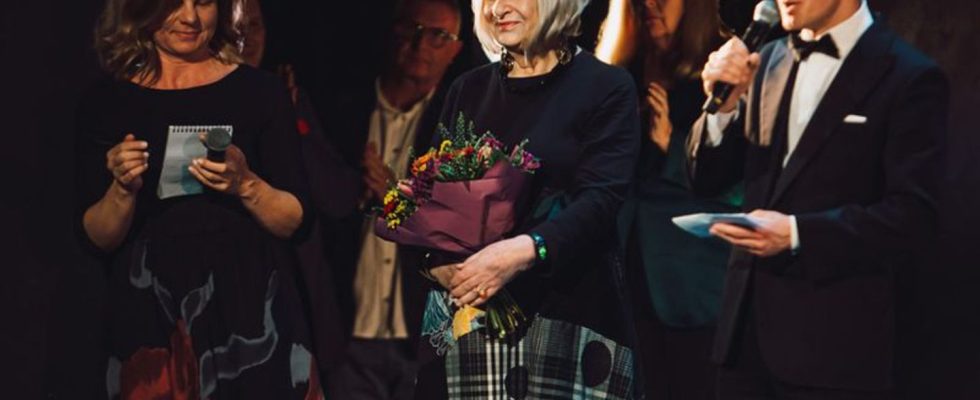National Socialism
Musical about a Polish Nazi resistance fighter
Holocaust survivor Elzbieta Ficowska (center) holds flowers after a performance of the musical “Irena”. photo
© Karpati & Zarewicz/dpa
Irena Sendler saved Jewish children from the Warsaw Ghetto. A Polish musical about her will be shown in Berlin on Sunday. One of those rescued – Elzbieta Ficowska – will sit in the audience.
In slow motion, Irena is beaten by SS officers with batons and kicks. Jazzy music is playing. The whole thing happens on a stage, usually in Poland, but now also in Berlin – once, on Sunday (May 5th). The musical “Irena” is about the Polish resistance fighter Irena Sendler (1910-2008), who smuggled 2,500 Jewish children out of the Warsaw Ghetto.
Holocaust and musical – do they go together?
In “Irena” the focus is on a Polish resistance fighter. The musical is an almost completely chronological sequence of her work, with inserts in which she looks retrospectively at her life.
A life that many people should know about. At the same time, it can sometimes seem strange when a story about the Holocaust is accompanied by musical singing. It seems somewhat strange when a Polish Nazi collaborator looks into the pants of a Jewish child living under a false name in order to denounce him to the Nazis – and sings at the same time.
Like any artistic production or film adaptation of the Holocaust, the work can never do justice to the atrocities that really happened.
Rescued people come to Berlin for the musical
But “Irena” can also be understood as a historical testimony that brings the events closer to a different target group in a musical format. One of those rescued by Sendler is Elzbieta Ficowska. As a baby, she was smuggled out of the ghetto in a wooden box and survived the Holocaust. Her parents were murdered. Today the 82-year-old still lives in Warsaw – and travels to Berlin for the first and only performance of the musical outside Poland. She is expected in the audience at the Admiral’s Palace on Sunday.
“I’m coming to Berlin because I think it’s necessary,” said Ficowska in an interview with the German Press Agency. “I am living proof that what happens on stage is the historical truth and not some made-up story.” Ficowska and Sendler met many times throughout their lives. “Ms. Sendler was not the quiet grandma that many people thought she was. She had a very strong personality and knew how to demand a lot from herself and other people.” As a teenager, Sendler advised her to study instead of going to a vocational school. “So she saved me a second time – I studied psychology and pedagogy.” Irena Sendler died in 2008 at the age of 98.
Poland during German National Socialism
For the producer of the musical and director of the Poznan Music Theater in Poland, Przemyslaw Kieliszewski, it is also important to promote German-Polish relations with projects like this. “In the past 50 years after the war there was too little contact between Germans and Poles.” There were certain things that couldn’t be dealt with – and it wasn’t about politics. “It’s about empathy and listening.” A partly unknown, positive story is told with Irena.
The role of the Poles during the occupation was not always clear. This still causes heated debates in Polish society today. Poland was invaded by Nazi Germany in 1939 and was under German occupation until 1945. A total of three million Polish Jews were murdered by the National Socialists. The occupiers imposed the death penalty on any Pole who helped Jews.
Nevertheless, there were many brave people who did exactly that. Irena Sendler was one of them. But also the Catholic farming couple Wiktoria and Jozef Ulma with their six children, who took in Jews. The Ulmas were betrayed and in 1944 the Nazis murdered the entire family. The books of renowned Holocaust researchers contain stories of courageous heroism, but also difficult to bear descriptions of anti-Semitism, denunciation and involvement of Poles in Nazi crimes. This severely undermines the historical myth of the saviors that Poland’s right likes to cultivate.
Youtube musical

